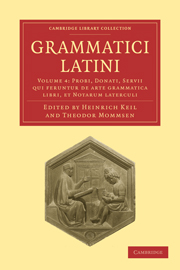Book contents
- Frontmatter
- PRAEFATIO
- PROBI CATHOLICA
- PROBI INSTITVTA ARTIVM
- VALERII PROBI DE NOMINE EXCERPTA
- [PROBI] DE VLTIMIS SYLLABIS LIBER AD CAELESTINVM
- NOTARVM LATERCVLI
- DE LITTERIS SINGVLARIBVS FRAGMENTVM
- NOTAE LVGDVNENSES
- NOTAE EX COD. REGINAE
- MAGNONIS LATERCVLVS ALTER V. NOTAE LINDENBROGIANAE
- NOTAE VATICANAE
- NOTAE PAPIANAE ET EINSIDLENSES
- PETRI DIACONI NOTAE LITTERARVM MORE VETVSTO
- DE PROBI QVI DICITVR NOTARVM LATERCVLO ALPHABETICO
- DONATI ARS GRAMMATICA
- MARII SERVII HONORATI COMMENTARIVS IN ARTEM DONATI DE FINALIBVS AD AQVILINVM DE CENTVM METRIS DE METRIS HORATII
- SERGII DE LITTERA DE SYLLABA DE PEDIBVS DE ACCENTIBVS DE DISTINCTIONE COMMENTARIVS EXPLANATIONES ARTIS DONATI
- INDEX SCRIPTORVM
- INDEX RERVM ET VERBORVM
- Additio Theodori Mommseni ad p. 277—281
- CORRIGENDA ET ADDENDA
- INDEX LIBRORVM QVI HOC VOLVMINE CONTINENTVR
NOTAE PAPIANAE ET EINSIDLENSES
Published online by Cambridge University Press: 10 November 2010
- Frontmatter
- PRAEFATIO
- PROBI CATHOLICA
- PROBI INSTITVTA ARTIVM
- VALERII PROBI DE NOMINE EXCERPTA
- [PROBI] DE VLTIMIS SYLLABIS LIBER AD CAELESTINVM
- NOTARVM LATERCVLI
- DE LITTERIS SINGVLARIBVS FRAGMENTVM
- NOTAE LVGDVNENSES
- NOTAE EX COD. REGINAE
- MAGNONIS LATERCVLVS ALTER V. NOTAE LINDENBROGIANAE
- NOTAE VATICANAE
- NOTAE PAPIANAE ET EINSIDLENSES
- PETRI DIACONI NOTAE LITTERARVM MORE VETVSTO
- DE PROBI QVI DICITVR NOTARVM LATERCVLO ALPHABETICO
- DONATI ARS GRAMMATICA
- MARII SERVII HONORATI COMMENTARIVS IN ARTEM DONATI DE FINALIBVS AD AQVILINVM DE CENTVM METRIS DE METRIS HORATII
- SERGII DE LITTERA DE SYLLABA DE PEDIBVS DE ACCENTIBVS DE DISTINCTIONE COMMENTARIVS EXPLANATIONES ARTIS DONATI
- INDEX SCRIPTORVM
- INDEX RERVM ET VERBORVM
- Additio Theodori Mommseni ad p. 277—281
- CORRIGENDA ET ADDENDA
- INDEX LIBRORVM QVI HOC VOLVMINE CONTINENTVR
Summary
In codice Parisino n. 7530 saeculi octavi grammatici fere argumenti (v. H. Keil in praef. vol. I. p. XVIII) f. 148—153 exhibetur notarum laterculus, cuius ad me apographum olim misit amicus, inscriptus manu antiqua incipit notas iuris, manu recentiore incipit de breviaturis per alphabetum, non diversus ab eo, quem glossario suo edito a. p. C. 1053 (v. Albericus Trium fontium apud Leibnitzium access. hist. 2, 88) s. v. notatio post excerpta ex Isidori etymologiis 1,21—26 inseruit Papias, ex Papia repetiverunt Lindenbrogius p. 152—175 et Putschius p. 1639—1666; unde Papianum ego quoque appellavi, quamquam ex supra dictis apparet laterculum tribus fere saeculis Papia esse vetustiorem.—Laterculum a Papiano non diversum, nisi quod accesserunt notationes quaedam, de quibus mox agetur, offendi in codice antea ‘dui Ulrici de Murtzůls’, postea monasterii Fabariensis s. Pfeffers, nunc monasterii Einsidlensis saec. X n. 326 (foll. 104. 80) illo ipso, qui solus fere nobis servavit saeculo nono confectam Latinarum inscriptionum syllogen antiquissimam omnium quarum notitia ad nos pervenit; legitur ibi f. 1—10 inscriptus sic: incipiunt notae Iulii Caesaris. Ab eo, qui scripsit codicem, laterculum in hanc formam non esse redactum, sed descriptum ex libro antiquiore vel illud fidem facit, quod laterculus mutilus est (incipit enim paulo post initium litterae C) codice integro; descriptum autem esse existimo ex codice Reichenaviensi qui sextus est in Reginberti catalogo a. 846 exarato (Neugart episc. Const. p. 548), in quo continebantur ‘notae Iulii Caesaris et liber Plinii Secundi de natura rerum’.
- Type
- Chapter
- Information
- Grammatici Latini , pp. 315 - 330Publisher: Cambridge University PressPrint publication year: 2009First published in: 1864



